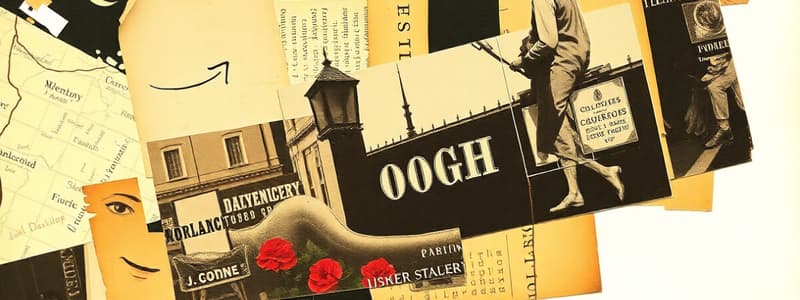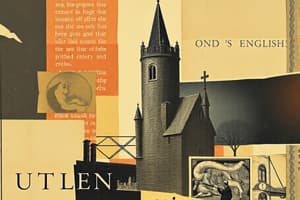Podcast
Questions and Answers
Which three Germanic tribes invaded Britain during the 5th century AD?
Which three Germanic tribes invaded Britain during the 5th century AD?
Angles, Saxons, Jutes
Old English is similar in sound and appearance to Modern English.
Old English is similar in sound and appearance to Modern English.
False (B)
What language did the Normans bring to England after the 1066 invasion?
What language did the Normans bring to England after the 1066 invasion?
French
Around what year did Middle English become dominant in Britain again?
Around what year did Middle English become dominant in Britain again?
What was a major factor in the standardization of English during the Early Modern English period?
What was a major factor in the standardization of English during the Early Modern English period?
What significant event during the Early Modern English period changed vowel pronunciation?
What significant event during the Early Modern English period changed vowel pronunciation?
Which of the following was a contributor to the vast vocabulary in Late Modern English?
Which of the following was a contributor to the vast vocabulary in Late Modern English?
American English has no influence from Spanish.
American English has no influence from Spanish.
What are some examples of Americanisms that originated in Britain?
What are some examples of Americanisms that originated in Britain?
Match the following varieties of English with their regions:
Match the following varieties of English with their regions:
What was the impact of the USA on English language today?
What was the impact of the USA on English language today?
Flashcards are hidden until you start studying
Study Notes
The Origins of English
- English language origins can be traced back to the 5th century AD, with the arrival of three Germanic tribes: the Angles, Saxons, and Jutes.
- These tribes, originating from what is now Denmark and northern Germany, migrated across the North Sea and invaded Britain.
- The native inhabitants of Britain at the time spoke Celtic languages.
- The arrival of the Germanic tribes led to the displacement of Celtic speakers, pushing them westward and northward into areas that now encompass Wales, Scotland, and Ireland.
- The Angles, particularly from England, had a language named “Englisc,” which is the root of the words "England" and "English."
Old English (450-1100 AD)
- The invading Germanic tribes spoke similar languages, which evolved into Old English.
- Old English differed significantly in sound and appearance from modern English, making it difficult for present-day native speakers to understand.
- Despite this, approximately half of the most frequently used words in modern English have Old English origins.
- Examples of words with Old English roots include "be," "strong," and "water."
- Old English remained the primary language until around 1100 AD.
Middle English (1100-1500 AD)
- In 1066, Duke William of Normandy (part of modern France) invaded and conquered England, becoming William the Conqueror.
- The Norman conquerors introduced a French dialect that became the language of the royal court, as well as the ruling and business classes.
- This led to a linguistic class division: the lower classes spoke English, while the upper classes primarily spoke French.
- By the 14th century, English regained dominance in Britain, but with a significant influx of French words incorporated into its lexicon.
- This blended language is known as Middle English.
- It was the language of the renowned poet Chaucer (1340-1400), although modern native English speakers would still find it challenging to comprehend.
Modern English
Early Modern English (1500-1800 AD)
- Towards the end of the Middle English period, a significant linguistic shift occurred, known as the Great Vowel Shift, which involved a change in vowel pronunciation, making them shorter.
- From the 16th century onward, the British encountered various peoples from around the world, enriching their language.
- The Renaissance, emphasizing classical learning, also contributed to the introduction of new words and phrases into the English language.
- The invention of printing played a crucial role in standardizing English.
- The widespread availability of books at lower costs led to increased literacy.
- Printing also established a standardized spelling and grammar system, with the London dialect, where most publishing houses were located, becoming the standard.
- The first English dictionary was published in 1604.
Late Modern English (1800-Present)
- The primary distinction between Early Modern English and Late Modern English lies in their vocabulary.
- Late Modern English boasts a significantly larger vocabulary, driven by two main factors:
- The Industrial Revolution and the development of technology created a necessity for new words.
- The British Empire, at its peak, spanned a quarter of the Earth's surface, leading to the adoption of foreign words from numerous countries.
Varieties of English
- The English colonization of North America around 1600 gave rise to a distinct American variety of English.
- Certain English pronunciations and words “froze” when they reached America, preserving older forms not found in later British English.
- Some expressions termed "Americanisms" by the British are in fact original British expressions that were maintained in the American colonies but lost for a time in Britain. Examples include:
- "trash" for "rubbish"
- "loan" as a verb instead of "lend"
- "fall" for "autumn"
- "frame-up" (reintroduced to Britain through Hollywood gangster films).
- Spanish had a noticeable influence on American English (and subsequently British English) with words like "canyon," "ranch," "stampede," and "vigilante" entering the language through the settlement of the American West.
- French words, through Louisiana, and West African words, through the slave trade, also influenced American English (and subsequently British English).
- American English holds significant influence today due to the USA's dominance in cinema, television, popular music, trade, and technology, including the Internet.
- There are numerous other varieties of English spoken worldwide, including Australian, New Zealand, Canadian, South African, Indian, and Caribbean English.
A Brief Chronology of English
- BC 55: Julius Caesar's Roman invasion of Britain. Local inhabitants spoke Celtic languages.
- AD 43: Roman invasion and occupation of Britain. Beginning of Roman rule. Local inhabitants still spoke Celtic languages.
- 43...: Roman withdrawal from Britain complete.
- ~449: Arrival of Germanic tribes (Angles, Saxons, Jutes) in Britain.
- ~476: End of the Western Roman Empire.
- ~500: Establishment of Anglo-Saxon kingdoms in Britain. Old English emerges.
- ~700: Christianization of the Anglo-Saxons.
- ~1066: Norman Conquest of England.
- ~1150: Middle English emerges.
- ~1485: The Wars of the Roses end. The Tudor dynasty begins in England.
- ~1500: The Renaissance begins in Europe.
- ~1534: The English Reformation.
- ~1600: Late Renaissance. The Elizabethan Age.
- ~1607: The founding of Jamestown, the first permanent British settlement in North America.
- ~1776: The American Revolution. The United States of America is established.
- ~1800: The Industrial Revolution begins in Britain.
- ~1837: Queen Victoria ascends to the throne of England.
- ~1900: The beginning of the 20th century.
- ~1945: World War II ends. The Cold War begins.
- ~1991: The dissolution of the Soviet Union. The end of the Cold War.
- ~2000: The beginning of the 21st century.
- Present: English continues to evolve.
Studying That Suits You
Use AI to generate personalized quizzes and flashcards to suit your learning preferences.




